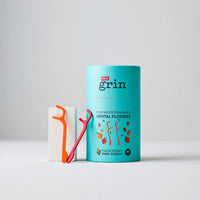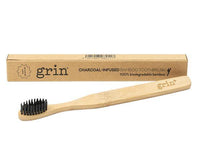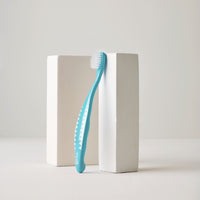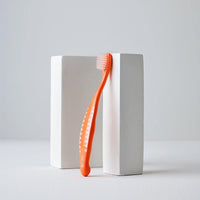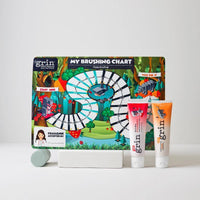How Does Stress in Children Affect Oral Health?
In light of June being Mental Health Month, it is important to raise awareness around childhood stress and the influence it may have on the mouth. According to the Mental Health Foundation, stress can be defined as our body’s response to pressure and can affect anyone, including young children. Just like adults and parents, children may also experience feelings of stress. Stress in children may result from their response to particular challenges, experiences, or overwhelming moments in their life.
As humans, we all respond differently to situations. Therefore, how an individual copes with stress will depend on their stage of development, personal experiences, and even genetic factors. Young children experiencing feelings of stress are more likely to have a difficult time verbally expressing their emotions. As a result, children often express their emotions in other ways.

The American Psychological Association and its research have identified common signs of stress in young children to include, but are not limited to:
- Difficulty with falling or staying asleep
- Changes in eating habits
- Short temperament or withdrawing from others
- Headaches, stomach aches, or feeling “sick.”
- Clinginess or signs of regression
In addition to behavioral changes as a response to stress, stress can also impact and play a significant role in a child’s oral health. Depending on a child’s age, verbalizing feelings may not be an option and in turn, the mouth may serve as an escape outlet for stress.
To speak on experience as a pediatric dental hygienist, I have lost track of how many parents voice concern over their toddler grinding their teeth at night. For some kids, this oral response serves as a reflection of something else going on in their life that may be creating a version of emotional distress or anxiety. For others, this may be a response to concentration or may have become a developed habit. This “grit and grind” oral response is often short-lived, however should be monitored if it carries on for a longer period.
Other common oral health factors associated with childhood stress may include:
- Signs of tooth wear or jaw-related discomfort related to extended clenching or grinding (bruxism) of teeth.
- Thumb/finger-sucking as a comforting oral habit to reduce stress levels.
- Chewing on objects or chewing/biting on the soft tissues of the mouth (inside of the cheek, lips, or tongue for example).
- New onset of gingivitis due to a lack of motivation for good oral hygiene practices.
- Tooth erosion or new signs of cavities related to a change in diet or eating habits.
- Tooth abrasion as a result of chewing on objects for comfort, such as nails, pens, or other objects.

What can you do as a parent if you notice your child picking up new or old comforting habits that could also affect their teeth?
- Try to understand what is causing your child to feel overwhelmed.
If your child is of the appropriate age, have a conversation about possible stress. This may help lead to learning about what is causing those feelings and help you develop age-appropriate coping mechanisms. If you cannot communicate verbally, observe your child during behavioral changes to help identify what is causing stress or anxiety.
- Incorporate activities into your child’s routine that provide comfort and feelings of joy.
Meditation, yoga, and exercise are some examples of stress relief activities that can help distract the mind from certain stressful triggers.
- Provide emotional support and help create a strong sense of self-esteem (AAP).
- Be consistent with your child’s bedtime routine. Help foster a relaxed mindset by reading or listening to music.
- Serve as a role-model.
If unhealthy eating habits are your child’s coping mechanism in stressful situations, serve as a role model in choosing healthy food alternatives and follow a disciplined snacking frequency regimen to reduce the amount of exposure teeth have to sugar. Hydrate with water to promote saliva production and a neutral oral environment following snacking.
- Create a positive oral hygiene routine.
If brushing and flossing creates more stress, kids will avoid it and their teeth and gums will suffer as a result. To help make oral health fun, consider singing songs or implementing a reward system to help your child feel accomplished. Grin Natural’s Brushing Challenge is a great way to help build self-esteem while encouraging good brushing habits.

- Schedule 6-month routine dental visits for oral health prevention and management.
If you suspect that stress is affecting your child’s mouth, inform your dental provider. They will be able to identify oral health problems related to stress during the dental exam and provide you with personalized recommendations.
- Consider scheduling a consultation with a medical and/or mental health provider.
Stress exists for everyone at some point in their lifetime, and children are no exception. While low levels of stress can be motivating for some, it can also lead to oral health problems if not managed well. Be creative when thinking of ways to help your child cope with stress in a healthy way for their mind, body, and mouth. And as always, if you or your child are struggling with stress, there are many resources available for support and you are encouraged to seek help.
Written by: Kristen Cockrell, RDH, MSDH
Kristen is a Pediatric Registered Dental Hygienist with a passion for preventive dentistry and oral health education. In addition to working full-time as a hygienist and mother to two young boys, Kristen is an oral health expert with Grin Natural.
Photo credits to our beautiful Grin mama @happy_little_duo




